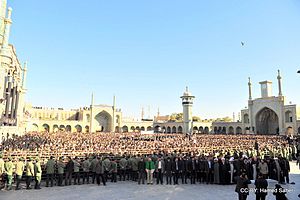- Salat al-Janazah
-
Salat al-Janazah (Arabic: صلاة الجنازة, Persian: نماز مرده یا نماز میت) is the Islamic funeral prayer; a part of the Islamic funeral ritual. The prayer is performed in congregation to seek pardon for the deceased and all dead Muslims. The Salat al-Janazah is a collective obligation upon Muslims (fard Kifayah) i.e., if some Muslims take the responsibility of doing it, the obligation is fulfilled, but if no-one fulfils it then all Muslims will be accountable.
Description of the funeral prayer
It is preferable that those praying divide themselves into odd rows with one person as an Imam standing alone in front and while facing in the direction of Mecca. The body is placed in front of the Imam. If there is more than one body, then they should be put one in front of the other. The spoken part of the prayer involves quietly reciting Al-Fatiha, then praying for God to bestow peace, mercy and blessings upon the Islamic prophet Muhammad, and finally saying two du'as. Muhammad and his companions explained how the funeral prayer is to be done, as follows [1]:
1. Having the appropriate neeyat (intention) in your heart, You say the first Takbir while raising your hands, then you fold and hold your hands on your breast in the usual manner, the right hand on the left seek refuge with Allah from the accursed Shayṭan, then you utter Bismillah and recite Fatihah followed by some recitation from Qur'an.
2. Then you say Takbir and Durood-e-Ibrahimi.
3.Then you say a third Takbir and make du'a for the deceased. It is narrated that Muhammad had said: "O God, forgive our living and our dead, those who are present among us and those who are absent, our young and our old, our males and our females. O God, whoever You keep alive, keep him alive in Islam, and whoever You cause to die, cause him to die with faith.O God, do not deprive us of the reward and do not cause us to go astray after this. O God, forgive him and have mercy on him, keep him safe and sound and forgive him, honour his rest and ease his entrance; wash him with water and snow and hail, and cleanse him of sin as a white garment is cleansed of dirt. O God, give him a home better than his home and a family better than his family. O God, admit him to Paradise and protect him from the torment of the grave and the torment of Hell-fire; make his grave spacious and fill it with light."
If you make du'a with other words, this is acceptable, for example, one could say: "O God, if he was a doer of good, then increase his good deeds, and if he was a wrongdoer, then overlook his bad deeds. O God, forgive him and give him the steadiness to say the right thing."
4. Then a fourth takbir is recited, followed by a short pause, then a final taslim to the right, saying "Assalaamu ‘alaykum wa rahmatu-Allah" ("Peace and blessings of God be unto you").
References
- ^ Kitaab Majmoo’ Fataawa wa Maqaalaat Mutanawwi’ah li Samaahat al-Shaykh ‘Abd al-‘Azeez ibn ‘Abd-Allaah ibn Baaz, vol 13, p. 141
External links
Categories:- Death customs
- Salat
- Islam stubs
Wikimedia Foundation. 2010.

